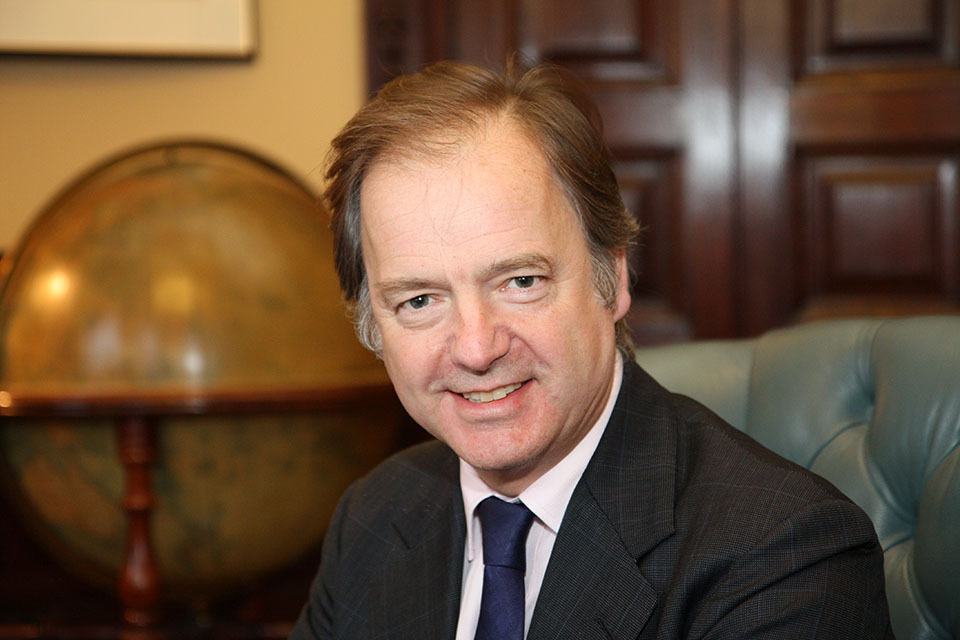Hugo Swire speaks on investment in Mongolia
During the Prime Minister of Mongolia's visit to the UK, Mr Swire spoke about the country's economic potential

It is a great pleasure to join you in this wonderful setting of Asia House - and for me personally, a great honour to welcome Prime Minister Chimed Saikhanbileg back to London.
Just over a year ago I was in Mongolia and saw for myself the breath-taking scenery of which Mongolians are rightly very proud.
This included the vast Gobi Desert, where I visited Rio Tinto’s investment in the the Oyu Tolgoi copper mine and saw for myself its enormous potential.
Re-emergence of Mongolia
In any case, I am delighted that the Prime Minister is here, straight off the plane from Washington. We have had excellent discussions with him, with the Prime Minister and the Foreign Secretary in Number 10, as well as with Trade Minister Lord Maude. There is a lot of enthusiasm in Government here about the prospects for our relationship.
Over the last decade, Mongolia’s Gross Domestic Product in purchasing power parity terms per capita has doubled. And it has the potential to become one of the fastest growing economies in the world. To see Mongolia back on its feet, and re-emerging once again to take its place in the global economy will be a great achievement for Mongolia and Mongolia’s people. And one that the United Kingdom is proud to support.
Mongolia’s economic reform is testament to the Prime Minister’s vision for his nation’s future, and to Mongolia’s determination to embrace the world. From hosting multilateral conferences such as the Freedom Online Coalition and next year’s annual Asia Europe Meeting, to entering into a partnership and cooperation agreement with the EU and its member states.
Mongolia is a trusted partner of the United Kingdom, and a leading voice among its neighbours:
For example it abolished the death penalty in 2012 and is now implementing ground-breaking planning tools for sustainable city development – partnered by a British organisation, the Ecological Sequestration Trust –which has the potential to make Mongolia a model for other cities and regions;
And next month Mongolia celebrates 25 years of democracy. This is a celebration that the world will want to share with Mongolia, because its example of managing a peaceful transition from communism is something that many can learn from. As is Mongolia’s unwavering commitment to democracy – democracy being, as Churchill famously said “the least worst form of government”.
Mongolia-UK Partnerships
Above all, Mongolia has become an increasingly attractive partner for trade, investment and cooperation. I think that Prime Minister Saikhanbileg himself deserves an enormous amount of credit for this. He has shown real leadership and made difficult political decisions to demonstrate that Mongolia is once again open for business.
Rio Tinto’s investment in the Oyu Tolgoi mine is now set to become one of the five largest in the world. The resource sector more broadly clearly offers tremendous opportunities.
But I know the Prime Minister has other ambitious ideas too, and I am keen that the UK should support him in this. We already have a partnership established between the London and Mongolian Stock Exchanges, and I believe the Prime Minister has spent time here in the City, for example with Lloyds of London, to ensure he has the correct investment architecture in place.
But the most precious resource for Mongolia’s future is its young people. That is why last year we deepened our academic links by increasing our Chevening scholarships in Mongolia. We want to increase these numbers, with increased commercial sponsorship.
And through Cambridge International Examinations, we are working with Mongolia to introduce Mongolian-English bilingual education in state schools and supporting the development of Mongolia’s curriculum to Cambridge International Standards. I know from our discussions yesterday that this is something the Prime Minister is personally very keen on.
Conclusion
Since Britain became the first Western country to establish relations with an independent Mongolia in 1963, our partnership has gone from strength to strength.
And I can only see more benefits in the years ahead. Mongolia has taken important steps towards economic reform, and shown the world that it is open for business.
By continuing to focus on its recovery, and developing an agile and open trade and investment policy through the changes in the year ahead, the future looks very bright indeed.
And as Mongolia moves forward, I hope it will continue to see the British Government – and British businesses – as valuable partners.